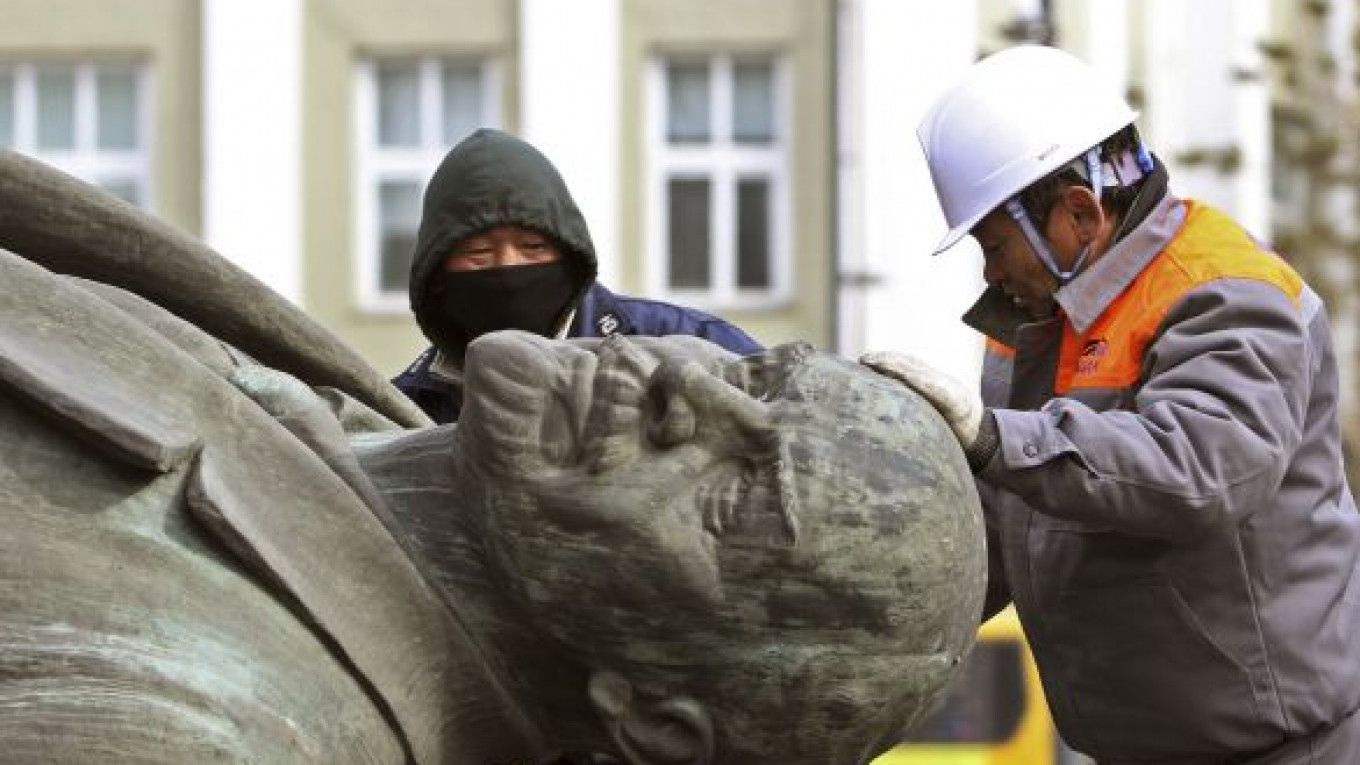ULAN BATOR, Mongolia — Brow furrowed, eyes glaring and one foot striding forward, the bronze statue of Bolshevik revolutionary Vladimir Lenin at the heart of the Mongolian capital of Ulan Bator was once a potent symbol of the reach of the Soviet Union.
Today the statue is neglected and discolored, its plinth is disintegrating, and an itinerant street peddler uses the base to display second-hand textbooks. The young Mongolians who scurry past in designer jeans and baseball caps are unlikely to miss it when it is auctioned and removed later this week.
The decision to part with the 4-meter relic of Soviet propaganda was made by Mayor Bat-Uul Erdene, known as one of the "original 13 Democrats" who helped overthrow Communism in a 1990 bloodless revolution.
"I think the Communists are big criminals not only to the outside world, but in front of their own people. So I believe we should take down this Lenin statue because it represents repression," Bat-Uul, a founding member of Mongolia's Democratic Party, said in an interview.
Bidding for the statue, erected 58 years ago, will start at 400,000 tugrik ($287) and Bat-Uul said two companies had already expressed interest, including a tourist yurt camp outside Ulan Bator that already owns a statue of Soviet dictator Josef Stalin.
Bat-Uul said he was surprised that the statue had survived as long as it had, given the millions who died in famines and mass executions under Soviet rule.
"We had a brutal communist regime in Mongolia too," he noted. "We lost about 40,000 people in just two years during the 1930s. They were killed in cold blood. It was genocide."
Thousands of Lenin statues were erected across the former Soviet bloc after his death in 1924, but most were torn down, melted for scrap, or repurposed as retro-Soviet decor in cafes and nightclubs following the collapse of the Soviet Union in 1991.
The Lenin statue in Ulan Bator managed to survive, largely because many older Mongolians still revere the Russian leader for supporting Mongolia in its fight for independence in 1921.
"If Russia did not exist and Lenin did not help us, then Mongolia would not exist either," said 55-year-old Erdenebileg Davagdorj, a driver. "The Russians saved us in 1921 and then again during World War II when the Japanese invaded our country. We owe them a lot."
The economic changes that have convulsed Mongolia since 1991 would already have had Lenin turning in his glass coffin. Mongolia is in the grip of a mining boom, and dozens of multinational firms have descended on the country, bringing their capitalist practices with them.
New economic and political freedoms have also inspired a revival in the cult of Genghis Khan, banned during the Communist era, and statues of the 13th century warlord have been installed throughout the country.
Bat-Uul said he hoped that a new monument would eventually replace Lenin, and some have already proposed a memorial dedicated to five people murdered in political violence in 2008.
Bat-Uul prefers a statue of former Mongolian Prime Minister Amar, executed in 1941 in the Russian city of Omsk.
"He defied the Communists until the end, and it cost him his life. 'I know how you Communists are. You haven't helped us. Instead you just want to colonize us. I do not agree with this.' Those were his last words," he said.
Related articles:
A Message from The Moscow Times:
Dear readers,
We are facing unprecedented challenges. Russia's Prosecutor General's Office has designated The Moscow Times as an "undesirable" organization, criminalizing our work and putting our staff at risk of prosecution. This follows our earlier unjust labeling as a "foreign agent."
These actions are direct attempts to silence independent journalism in Russia. The authorities claim our work "discredits the decisions of the Russian leadership." We see things differently: we strive to provide accurate, unbiased reporting on Russia.
We, the journalists of The Moscow Times, refuse to be silenced. But to continue our work, we need your help.
Your support, no matter how small, makes a world of difference. If you can, please support us monthly starting from just $2. It's quick to set up, and every contribution makes a significant impact.
By supporting The Moscow Times, you're defending open, independent journalism in the face of repression. Thank you for standing with us.
Remind me later.






